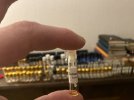There is one valid point he is making and that is; selling different pulls of the oil is not the whole oil or representation of the wood. Imagine you get cow's milk and you sell the whey, Creame, and Cheese each separately and call each one milk.
Selling different pulls of the oil is a bit like selling whey and calling it milk, or Creame and calling it milk, or cheese and calling it milk.
Having got that out of the way, as I have said before and it's good to see others are now catching along, the term fractioning is misused in the online Oudh world by both vendors and customers, except a few. Collecting oils at different times in the distillation process is not fractioning.
As
@Andrew Salkin has said the rest of what is being said is simply marketing, the content of it is directed at those who are calling their oils clean, it is trying to discredit their process, create a bit of drama, get some more attention.
I remember few years back when it was fancy to use bottled water for distillation, I wrote about how distillation cleans water, what is interesting and fairly basic, the distillation process itself is also a type of filtering process. In survival training one learns that if the water is very dirty or polluted cover it with a plastic or something that will allow the steam to condense and drink the water that rises as steam.
I guess at the end of the day customers also have an obligation to themselves to question what is put Infront of them as 'knowledge'. Knowledge is power and the minute the customer acquires proper knowledge and not marketing fluff they will then make educated choices regarding these matters.
One of the issues with the whole clean smelling oil conversation is that there is a assumption wrapped in it that if it isn't clean smelling then somehow it is lacking, inferior or contaminated with auxiliary elements. That proposition itself is problematic.
It is problematic because it is creating the mindset that heavy oudhs are somehow contaminated with auxiliary elements. Then to support that the people who claim that will then start making claims about soaking and barn and associate barn with fermentation etc.
Whilst in reality, there are oudhs that without soaking will give you barn, there are oudhs with soaking will smell ethereal and top heavy 'clean', using
@EJayB s Thai plantation wood example, If you soak Thai plantation wood for 2 weeks it will give a much more 'clean' ethereal Oudh oil then if you didn't soak it, without a soak it smells waxy even gasy.
Oudh without much effort can provide an array of different smells from outright barn to ethereal and more clean than Vicks. I put the blame of the misinformation on enthusiastic vendors who would start writing with conclusive claims in their first couple of years of distillation and they hadn't come across enough situations to experience a lot of the possibilities. Today the content of those blogs, posts etc are for many foundations of how they see oudh oils. If customers have consumed those contents then There is a lot the consumer needs to undo before reaching the reality in some of these matters.

